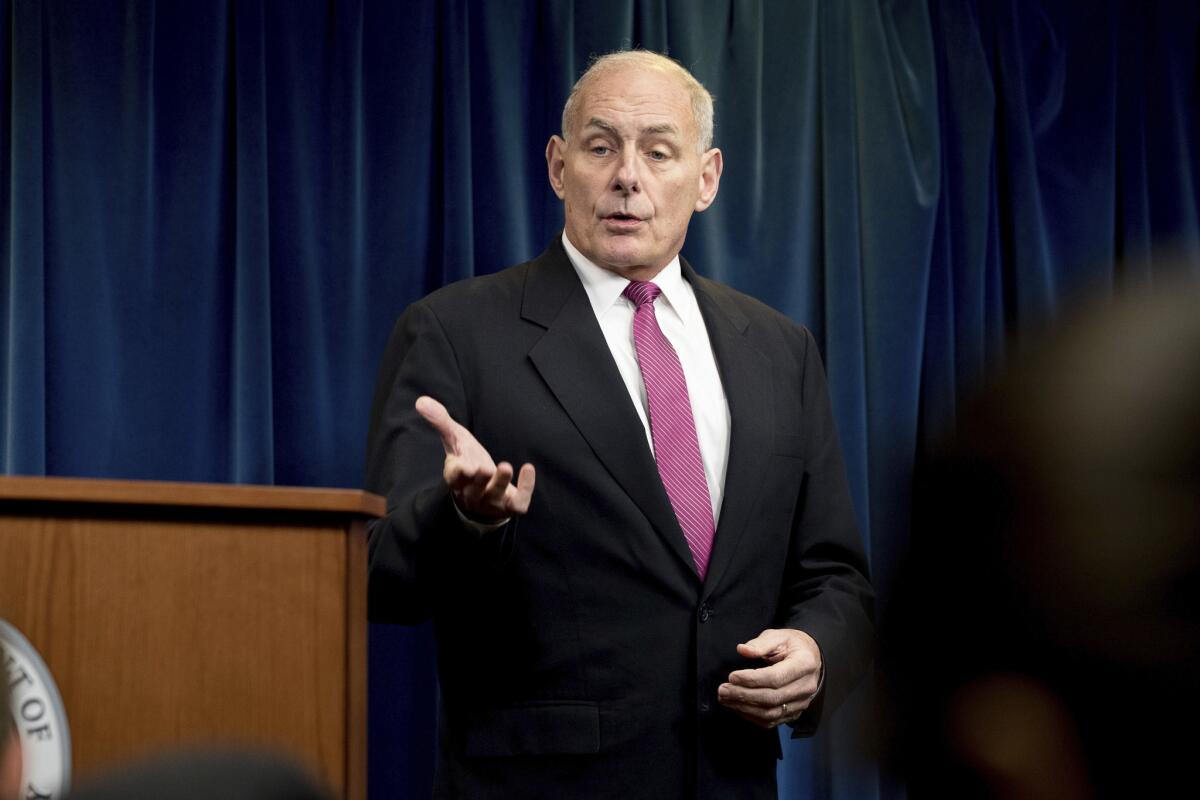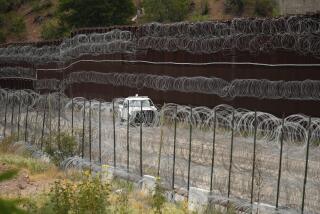Trump administration signals that some bans on U.S. entry could be extended indefinitely

Reporting from Washington — The Trump administration signaled Tuesday that some of the temporary bans on travelers from seven predominantly Muslim countries are likely to be extended indefinitely and elevated a deportations official to run the nation’s top immigration enforcement agency as it pushed further to dramatically restrict U.S. immigration policy.
Top immigration officials, led by newly sworn-in Homeland Security Secretary John F. Kelly, moved to allay the havoc that marked the rollout of the bans over the weekend. They visited Capitol Hill to reach out to Republican lawmakers upset over being excluded while the order was being developed and separately briefed reporters on adjustments to the program.
They also acknowledged that the disruption was more widespread than previously known, saying 721 travelers were denied boarding on flights to the U.S. But some 872 refugees were exempted from the ban because of undue hardships and will be arriving in the U.S. this week, said Kevin McAleenan, acting commissioner of Customs and Border Protection.
“The vast majority of the 1.7 billion Muslims that live on this planet, the vast majority of them have, all other things being equal, have access to the United States,” Kelly told reporters. “And a relatively small number right now are being held up for a period of time until we can take a look at what their procedures are.”
Kelly pressed forward with Trump’s plans to transform U.S. border policy, saying for the first time that some of the restrictions that caused confusion and sparked protests over the weekend could be extended well into the future.
Among the countries on the banned list — Iraq, Iran, Syria, Sudan, Somalia, Libya and Yemen — many “are in various states of collapse,” Kelly said, and have poor record-keeping or unreliable police forces that undermine U.S. border officials’ efforts to determine travelers’ identities and criminal histories.
“Some of those countries that are currently on the list may not be taken off the list anytime soon,” while federal officials review screening procedures for visa applicants from those countries, he said. Trump ordered all travelers from those nations prohibited from entering the U.S. for 90 days; in addition, refugees from Syria are blocked indefinitely and those from any other country are barred for 120 days.
The list of banned countries may expand; Trump’s order directed Kelly to submit within 60 days a list of additional nations whose citizens should be prohibited from traveling to the U.S. as well.
The moves signaled that the White House remained committed to remaking border law enforcement while trying to combat the widespread condemnation brought on by Trump’s orders.
White House officials were under fire for not giving clear instructions to border officials, which sowed confusion at airports across the country. Senior Trump aides decided to circulate the draft of the order only among a small, tightly controlled group of experts and Cabinet secretaries.
U.S. Customs and Border Protection, the agency that runs hundreds of immigration checkpoints at the country’s airports and ports of entry, did not prepare instructions for border officials in advance of the order being signed Friday evening. Changes to who would be allowed in the country were made on the spot over the weekend, as were new procedures for awarding waivers from the travel bans while travelers were detained inside airports.
“The notion that the operators who have to implement this across hundreds of ports of entry would first see this order at 5 p.m. on a Friday is shocking,” said John Sandweg, a former senior immigration official under President Obama.
“It looks to me like they have only now become aware of the impacts of the policy the drafters didn’t foresee or the White House didn’t foresee,” he said.
“The rollout of this executive order was terrible,” said New Jersey Gov. Chris Christie, a Republican and a Trump supporter, blaming the president’s staff for not doing more to predict potential problems.
GOP senators, who were inundated with requests from constituents for assistance, aired their complaints to Vice President Mike Pence, a guest at their weekly lunch at the Capitol on Tuesday.
White House officials understood that they risk their relationships with Republican lawmakers over how the order was executed, said Sen. Bob Corker (R-Tenn.), the chairman of the Foreign Relations Committee.
“What I don’t know yet is whether it’s a concern or not on their end,” he said. “It may be the way they want to roll right now.”
When asked whether the executive order is legal, Corker responded: “I don’t know yet.”
Kelly, McAleenan and other top Homeland Security officials conceded some problems as implementation began, including poor communication. But they maintained that all court orders were followed, rebutted reports that some legal residents were denied access to attorneys at airports and said everyone detained by border agents was treated with “dignity and respect.”
The White House, which has contended that the president’s order was not aimed at Muslims despite Trump promising such a move during his campaign, even backed off from the term “ban,” as did Kelly.
Trump used the term as recently as Monday, but facing backlash from many directions, the White House adamantly insisted Tuesday that the word is verboten.
“This is not a ban,” Press Secretary Sean Spicer told reporters in a fiery news briefing.
“When we use words like ‘travel ban,’” he said later, “that misrepresents what it is. It’s seven countries previously identified by the Obama administration, where, frankly, we don’t get the information that we need for people coming into this country.”
Spicer appeared to be making a renewed effort to distinguish the order from the all-out ban on Muslims entering the country that Trump proposed during the campaign, but many around the world see the newest policy as an outgrowth of that proposal.
Trump himself conceded a religious connection when he said in an interview Friday that he wanted to make it easier for Syrian Christians to enter the country. Former New York Mayor Rudolph W. Giuliani, a leading Trump surrogate and advisor during the campaign, told Fox News that the order sprang from a group he formed at Trump’s request to create a legal framework that would accomplish the campaign goal of a “Muslim ban.”
And Kelly traced his knowledge of the issue to Trump’s campaign call for a “total and complete shutdown of Muslims entering the United States until our country’s representatives can figure out what is going on.”
White House officials have asserted that the ban has wide support, but a Reuters/Ipsos poll conducted Monday and Tuesday found that 49% of Americans said they either “strongly” or “somewhat” agreed with Trump’s order, and 41% “strongly” or “somewhat” disagreed, with the divide split along party lines. Another 10% said they didn’t know.
Trump also named a longtime deportation officer, Thomas Homan, as acting director of U.S. Immigration and Customs Enforcement, where he will oversee the execution of the president’s immigration enforcement orders issued last week. Those orders widened the targets for deportation beyond those convicted of crimes to include people in the U.S. illegally who are charged with or simply suspected of crimes.
And longtime agent Ronald Vitiello was named to run the Border Patrol, after former chief Mark Morgan, who had been brought in from the FBI to reform the agency, was pushed out by Trump officials. Vitiello is a favorite of the Border Patrol union that endorsed Trump and has been given large sway over department decisions.
Times staff writers Noah Bierman and Lisa Mascaro contributed to this report.
Twitter: @ByBrianBennett
ALSO
When Trump says he wants to deport criminals, he means something starkly different than Obama
Yes, Trump can boost deportations and gut the Dreamer program for young immigrants
An outsider takes charge of the Border Patrol — and yes, he’ll wear the green uniform
More to Read
Get the L.A. Times Politics newsletter
Deeply reported insights into legislation, politics and policy from Sacramento, Washington and beyond. In your inbox three times per week.
You may occasionally receive promotional content from the Los Angeles Times.











